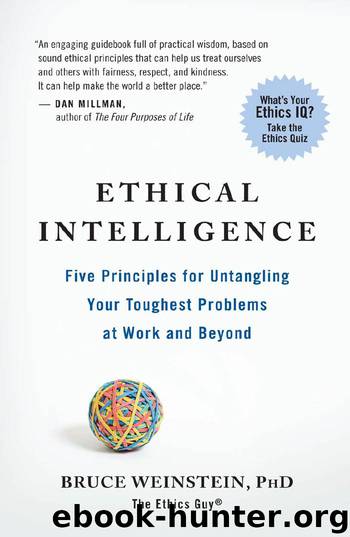Ethical Intelligence: Five Principles for Untangling Your Toughest Problems at Work and Beyond by Bruce Weinstein Phd

Author:Bruce Weinstein Phd [Weinstein, Bruce Phd]
Language: eng
Format: epub
Tags: Psychology
ISBN: 1608680541
Amazon: B005K223SK
Publisher: New World Library
Published: 2011-08-30T03:00:00+00:00
WHEN THE CEO TAKES A LEAVE OF ABSENCE
On January 17, 2011, Apple cofounder and CEO Steve Jobs told employees that he would be taking a medical leave, his third in seven years. He didn’t reveal any details about his illness but asked that his family’s privacy, as well as his own, be respected.3
Was this an ethically intelligent request for Jobs to make? What would an ethically intelligent response for Apple’s stakeholders be?
The Right to Privacy and the CEO
In chapter 2, I explained that the third principle of ethical intelligence, Respect Others, calls upon us to keep private things private. I suggested that the two physicians who discussed a patient’s medical condition and mentioned the patient’s full name in a hospital elevator had betrayed the patient’s trust. Presumably that patient would not have wanted sensitive information about his medical condition discussed in front of people like me, and he was entitled to have his wish respected.
But not everyone has a right to have information about his or her health kept private. Some leadership roles require transparency because others have a right to know whether their leader is capable of doing the job at hand. For example, the president of the United States cannot legitimately claim a right to medical privacy; democracy requires that citizens be informed about their leader’s health because health is a necessary condition for being able to protect their interests through this supremely demanding work. That the public has a right of access to the president’s medical condition has been recognized only recently. Information about Grover Cleveland’s surgery to remove an oral cancer, Woodrow Wilson’s stroke, and Franklin D. Roosevelt’s melanoma was kept from public view for fear that it would damage the president’s political power, but this is now rightly regarded as something one expects in a totalitarian state, not a democracy.4
The CEO of a publicly traded company is to the company’s stakeholders what the leader of a democratic society is to its citizens in at least one sense: both leadership positions entail restrictions on the leader’s right to privacy. No one forces a person to take the helm of a public company or a country; one does so with the understanding that the job requires a degree of transparency that doesn’t apply to most other people. Stakeholders and citizens alike are entitled to know what is going on with the person they chose to lead them. When this person falls ill, he or she ought to disclose his or her current medical condition and prognosis, the treatment options, and how well he or she is doing as this ordeal progresses. Thus the ethically intelligent thing for Jobs to have done when announcing his medical leave would have been to explain the nature of his illness (while rightfully expecting stakeholders to leave his family alone).
Some worry about the financial implications for the company that such a disclosure would have. But in the long run, the organization is likely to benefit, not lose, financially because it’s the lack
Download
This site does not store any files on its server. We only index and link to content provided by other sites. Please contact the content providers to delete copyright contents if any and email us, we'll remove relevant links or contents immediately.
| Ethics | Etiquette |
| Fashion & Image | Health & Stress |
| Motivation & Self-Improvement | Work Life Balance |
| Workplace Culture |
Tools of Titans by Timothy Ferriss(8360)
Change Your Questions, Change Your Life by Marilee Adams(7732)
Deep Work by Cal Newport(7056)
Playing to Win_ How Strategy Really Works by A.G. Lafley & Roger L. Martin(6206)
Man-made Catastrophes and Risk Information Concealment by Dmitry Chernov & Didier Sornette(5996)
Digital Minimalism by Cal Newport;(5745)
Big Magic: Creative Living Beyond Fear by Elizabeth Gilbert(5744)
Ego Is the Enemy by Ryan Holiday(5407)
The Slight Edge by Jeff Olson(5405)
The Motivation Myth by Jeff Haden(5202)
The Laws of Human Nature by Robert Greene(5154)
Stone's Rules by Roger Stone(5078)
Tuesdays with Morrie by Mitch Albom(4763)
Eat That Frog! by Brian Tracy(4511)
Rising Strong by Brene Brown(4444)
Skin in the Game by Nassim Nicholas Taleb(4232)
The Money Culture by Michael Lewis(4185)
Bullshit Jobs by David Graeber(4176)
Skin in the Game: Hidden Asymmetries in Daily Life by Nassim Nicholas Taleb(3986)
